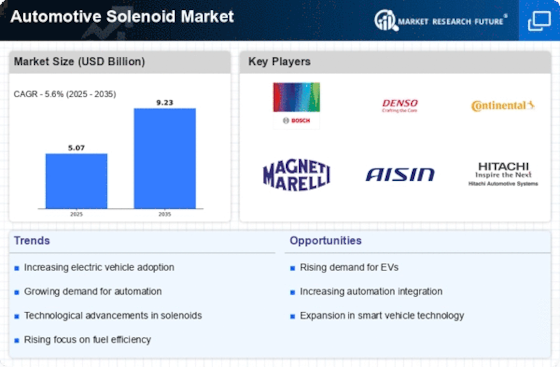Market Trends
Key Emerging Trends in the Automotive Solenoid Market
The burgeoning demand for solenoid valves finds its roots in the increased adoption of these valves across various process sectors, driven by a growing inclination towards enhanced process automation. A notable sector witnessing the extensive deployment of solenoid valves is the water treatment industry, where these valves play a pivotal role in addressing diverse operational needs. As the quest for more efficient water treatment processes intensifies, the demand for solenoid valves is poised for continuous growth in the foreseeable future.
Within the water treatment industry, solenoid valves find versatile applications, spanning from tank filling operations to serving as essential components in water softeners. These valves, fabricated from materials such as plastic, brass, and stainless steel, cater to a spectrum of functions, including piloting larger actuated valves with air or water and serving as intake valves for various equipment. The choice of material hinges on the specific requirements of the application and the environmental conditions it encounters. While all three materials are suitable for mains water use, considerations such as ambient temperature and exposure to physical effects are pivotal in determining the most appropriate valve body material.
Certain industrial processes within the water treatment domain demand water purity that meets or exceeds the stringent standards set for potable drinking water. Continuous systems, often treating substantial volumes of water at pressures ranging from 100 to 1,000 PSIG, are employed to ensure water quality. Various membranes and processes come into play, tailoring the treatment to achieve the required water quality. Notable applications exemplifying this stringent requirement include:
Boilers: Industries utilizing steam to power turbines engage in water treatment to cleanse water before it is converted into steam. Contaminated water, when converted into steam, poses a risk of turbine blade damage, leading to shutdowns and maintenance issues. The cost-effectiveness of water purification becomes evident as it extends the turbines' lifespan.
Pharmaceuticals: The pharmaceutical sector demands pure water, devoid of dissolved particles, bacteria, and organics, to ensure the production of consistent and uncontaminated goods. The purity standards for pharmaceutical medicines often require dissolved particle levels significantly lower than those considered safe for drinking water. Systems like Reverse Osmosis (RO) are employed in tandem with other water treatment techniques to meet these stringent requirements.
Food and Beverage: The production of safe and high-quality food and beverages hinges on the use of purified water. RO systems, complemented by other treatment methodologies, play a crucial role in ensuring the safety and consistent flavor and odor of the final products.
Agriculture: While irrigation water may not necessitate the same level of purity as drinking water, sourcing suitable water for agricultural purposes can be challenging. Simple RO systems, processing non-potable water, bring the water up to agricultural standards, even if it remains non-potable.
The escalating demand for solenoid valves is intricately linked to their pivotal role in water treatment industries. As these industries evolve and emphasize efficiency and precision in their processes, solenoid valves emerge as indispensable components, catering to diverse applications and ensuring the integrity and quality of water treatment operations across various sectors.






Leave a Comment